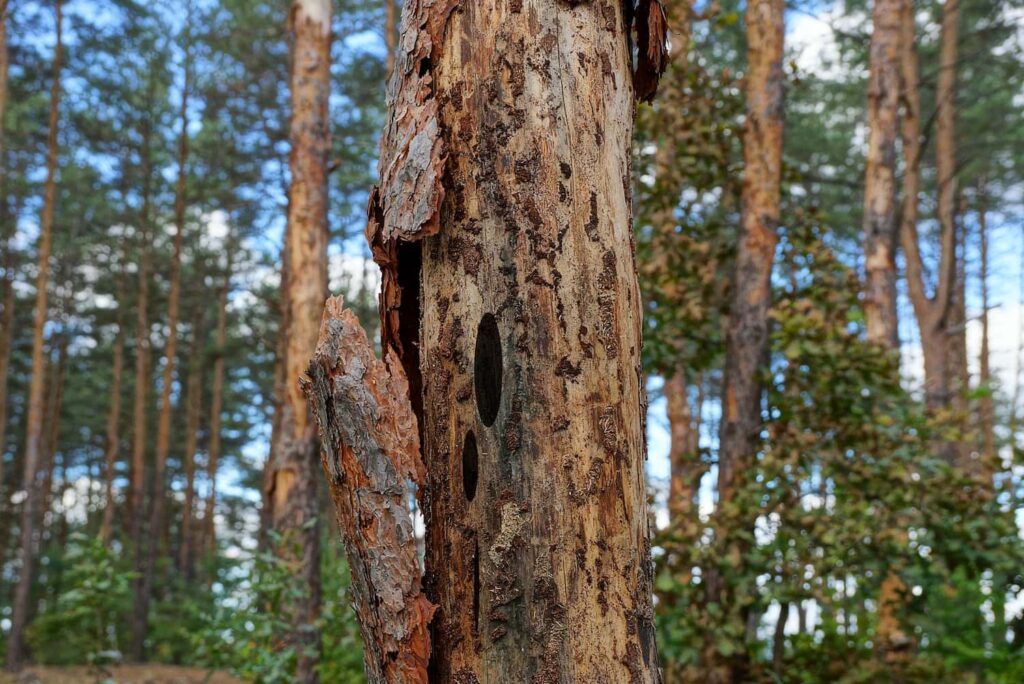Hypoxylon Canker is an extremely destructive fungal disease that targets trees that are already weakened.
What is Hypoxylon Canker?
Hypoxylon canker is a fungal disease that affects trees, particularly hardwood trees such as oak, maple, and ash. It is caused by the fungus Hypoxylon mammatum, which is found in most temperate regions of the world.
The fungus infects the tree through wounds or natural openings, such as leaf scars or lenticels. It then grows within the tree’s tissues, causing the tree to produce abnormal amounts of lignin, a chemical compound that gives wood its strength and rigidity. This overproduction of lignin causes the tree’s tissues to become thick and woody, leading to the formation of cankers on the tree’s branches and trunk.
Cankers are small, sunken areas on the tree’s bark that are often surrounded by a ridge of swollen tissue. They are usually dark in color and may be surrounded by yellow or brown discoloration. The fungus may also produce fruiting bodies, which are small, black, spore-producing structures that can be seen on the surface of the canker.
Common Hypoxylon Canker Symptoms
The symptoms of hypoxylon canker vary depending on the tree species and the stage of the disease. In the early stages, the tree may exhibit yellow or brown leaves, premature leaf drop, or thinning of the canopy. As the disease progresses, the tree may develop dead branches or a thinning canopy. In severe cases, the tree may die.
- Dark spots on tree bark.
- Yellow or brown leaves.
- Premature leaf drop.
- Thinning of the canopy.
- Dead branches.
How Does It Spread?
One of the most common ways that hypoxylon canker spreads is through the movement of infected wood or debris. For example, if an infected tree is cut down and the wood is used to make firewood or wood chips, the fungus can spread to other trees through contact with these materials.
Prevention and Treatment
To prevent the spread of hypoxylon canker, it is important to practice proper tree care and maintenance. This includes avoiding wounding trees unnecessarily, such as by pruning branches too close to the trunk or driving nails into the tree. It is also important to properly sterilize pruning tools between uses to prevent the spread of the fungus from one tree to another.
If a tree is infected with hypoxylon canker, it may be possible to slow the spread of the disease through the use of fungicides. However, treatment is often expensive and may not be effective if the tree is already heavily infected. In such cases, the best course of action may be to remove the infected tree to prevent the spread of the disease to other trees.
Conclusion
In conclusion, hypoxylon canker is a serious fungal disease that can cause significant damage to trees. It is important to practice proper tree care and maintenance in order to prevent the spread of the disease, and if a tree is infected, it may be necessary to remove it in order to protect other trees. Looking for other Tree Diseases?
Want To Talk To A Certified Arborist?
Do you have more questions about your oak tree? Do you have oak wilt on the trees on your property? Do you have Tree Disease on your property in Texas? Call us today at (817) 799-7808 to talk to our Tree Care Experts.
North Texas Tree Care
As a North Texas-based tree care company, Oakwilt.org does more than just provide industry-leading tree care, we’re here to serve our beloved community. By giving our North Texas trees proper care and maintenance through routine tree check-ups and treating them for oak wilt when necessary, we can promote a greener, more sustainable North Texas community. For help with tree disease treatment and tree nutrition, tree care and tree insect management, soil conditioning, and more, contact our ISA Certified Arborists to get started.
Oakwilt.org is a full-service sustainable tree care company offering residential and commercial tree services in Dallas, Waco, Austin, Fort Worth, San Marcos, San Antonio, DFW, and more. Contact our North Texas tree care experts at (817) 799-7808 and enjoy 5-star rated tree care customer service and the best tree health services in North Texas!
To learn more about North Texas Tree Diseases: Actinopelte Leaf Spot, Anthracnose, Bacterial Leaf Scorch, Crown Gall, Dutch Elm Disease, Hypoxylon Canker, Oak Leaf Blister, Oak Wilt, Rapid Oak Decline, Sudden Oak Death, call our North Texas team of Arborist
at (817) 799-7808 or fill out the contact form.
We’re a little different than the average tree care company.
Learn more about Oakwilt.org ISA Certified Arborists!
Our North Texas-based tree doctors can explain how sustainable tree care services add more value to your properties.
Find out more today by giving us a call today.

